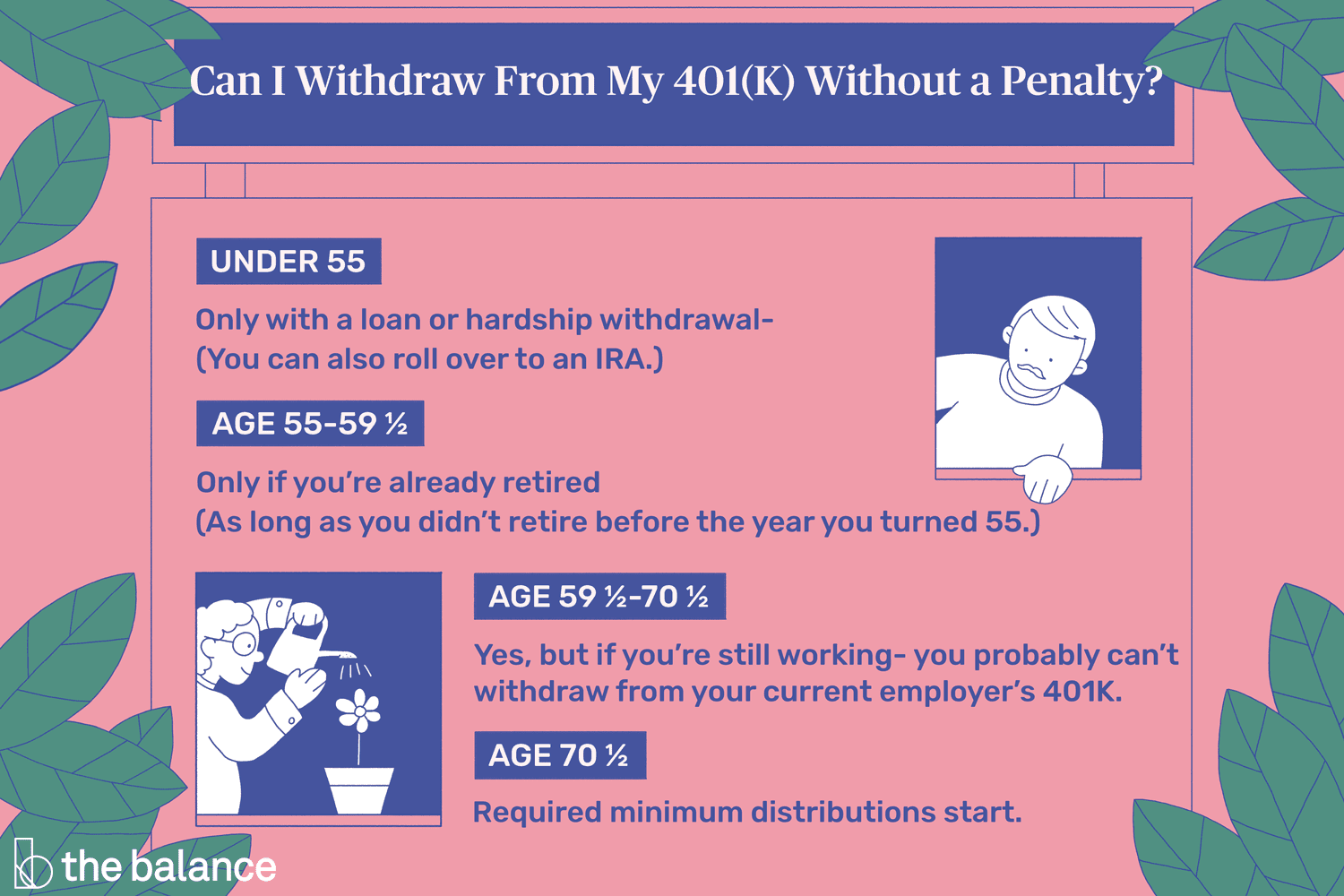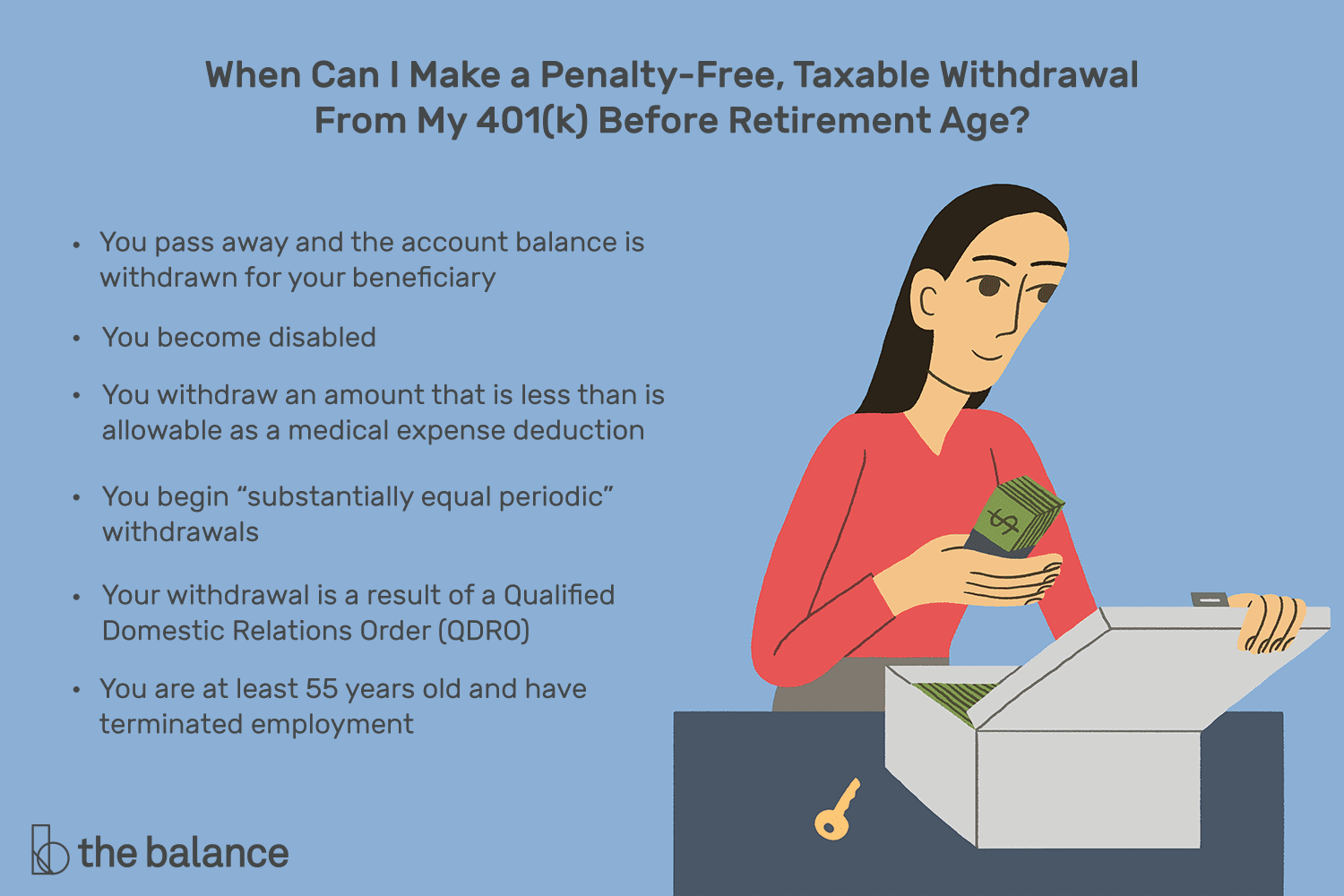Other Alternatives To Taking A Hardship Withdrawal Or Loan From Your 401
- Temporarily stop contributing to your employers 401 to free up some additional cash each pay period. Be sure to start contributing again as soon as you can, since foregoing the employer match can be extremely costly in the long run.
- Transfer higher interest rate credit card balances to a lower rate card to free up some cash or take advantage of a new credit card offer with a low interest rate for purchases .
- Take out a home equity line of credit, home equity loan or personal loan.
- Borrow from your whole life or universal life insurance policy some permanent life insurance policies allow you to access funds on a tax-advantaged basis through a loan or withdrawal, generally taken after your first policy anniversary.
- Take on a second job to temporarily increase cash flow or tap into family or community resources, such as a non-profit credit counseling service, if debt is a big issue.
- Downsize to reduce expenses, get a roommate and/or sell unneeded items.
What To Ask Yourself Before Making A Withdrawal From Your Retirement Account
There are many valid reasons for dipping into your retirement savings early. However, try to avoid the mindset that your retirement money is accessible. Retirement may feel like an intangible future event, but hopefully, it will be your reality some day. So before you take any money out, ask yourself: Do you actually need the money now?
Think of it this way: Rather than putting money away, you are actually paying it forward. If you are relatively early on in your career, your present self may be unattached and flexible. But your future self may be none of those things. Pay it forward. Do not allow lifestyle inflation to put your future self in a bind.
With all this talk of 10% penalties, and not touching the money until youre retired, we should point out that there is a solution if you feel the need to be able to access your retirement funds before you reach age 59 ½ without penalty.
Contribute to a Roth IRA, if you qualify for one.
Because contributions to Roth accounts are after tax, you are typically able to withdraw from one with fewer consequences. Keep in mind that there are income limits on contributing to Roth IRAs, and that you will still be taxed if you withdraw the funds early or before the account has aged five years, but some people find the ease of access comforting.
For some folks, however, a Roth-type account is not easily available or accessible to them.
What Are The Penalty
The IRS permits withdrawals without a penalty for certain specific uses, including to cover college tuition and to pay the down payment on a first home. It terms these “exceptions,” but they also are exemptions from the penalty it imposes on most early withdrawals.
It also allows hardship withdrawals to cover an immediate and pressing need.
There is currently one more permissible hardship withdrawal, and that is for costs directly related to the COVID-19 pandemic.
You’ll still owe regular income taxes on the money withdrawn but you won’t get slapped with the 10% early withdrawal penalty.
You May Like: How To Open 401k For Individuals
How Does Money Get Left Behind
Very few people stay at one employer the entire length of their career.
But unlike your bank account which you may have from job to job, a 401 account is linked to your employer. It is up to you to do something about it.
When you leave your employer, the money may stay in the account for an indefinite amount of time.
However, if the company closes the 401 plan, files for bankruptcy, goes out of business or is acquired by another company, you may be forced to decide, within a short period of time.
Its possible that years will go by after you parted ways with your old job, and then youll get a letter notifying you that you need to move your 401 account, or take a distribution.
If this happens, youre much better off rolling the money into an IRA account, or transferring the money into your current companys 401 plan.
Weighing Pros And Cons

Before you determine whether to borrow from your 401 account, consider the following advantages and drawbacks to this decision.
On the plus side:
- You usually dont have to explain why you need the money or how you intend to spend it.
- You may qualify for a lower interest rate than you would at a bank or other lender, especially if you have a low credit score.
- The interest you repay is paid back into your account.
- Since youre borrowing rather than withdrawing money, no income tax or potential early withdrawal penalty is due.
On the negative side:
- The money you withdraw will not grow if it isnt invested.
- Repayments are made with after-tax dollars that will be taxed again when you eventually withdraw them from your account.
- The fees you pay to arrange the loan may be higher than on a conventional loan, depending on the way they are calculated.
- The interest is never deductible even if you use the money to buy or renovate your home.
CAUTION: Perhaps the biggest risk you run is leaving your job while you have an outstanding loan balance. If thats the case, youll probably have to repay the entire balance within 90 days of your departure. If you dont repay, youre in default, and the remaining loan balance is considered a withdrawal. Income taxes are due on the full amount. And if youre younger than 59½, you may owe the 10 percent early withdrawal penalty as well. If this should happen, you could find your retirement savings substantially drained.
Recommended Reading: How Much Can You Take Out Of Your 401k
Take An Early Withdrawal
Perhaps youre met with an unplanned expense or an investment opportunity outside of your retirement plan. Whatever the reason for needing the money, withdrawing from your 401 before age 59½ is an option, but consider it a last resort. Thats because early withdrawals incur a 10% penalty on top of normal income taxes.
While an early withdrawal will cost you an extra 10%, it will also diminish your 401s future returns. Consider the consequences of a 30-year-old withdrawing just $5,000 from his 401. Had the money been left in the account, it alone would have been worth over $33,000 by the time he turns 60. By withdrawing it early, the investor would forfeit the compound interest the money would accumulate in the years that follow.
What If You Only Need The Money Short Term
Although there are other qualifying exceptions to withdraw IRA or 401k assets penalty-free, those listed above are the major ones. But suppose youre not interested in paying any taxes at all. You can still use your 401k to borrow money via a loan. The interest goes to you, the loan isnt taxable, and it wouldnt show up on your credit report. Heres how it works.
Also Check: Can I Move Money From 401k To Roth Ira
Your Retirement Money Is Safe From Creditors
Did you know that money saved in a retirement account is safe from creditors? If you are sued by debt collectors or declare bankruptcy, your 401k and IRAs cannot be liquidated by creditors to satisfy bills you owe. If youre having problems managing your debt, its better to seek alternatives other than an early withdrawal, which will also come with a high penalty.
Claim Solo 401k Contributions On Your Tax Return For An S
Is your business a corporation? If so, business income and contributions do not pass directly to your personal income tax return. There is a different tax reporting process that requires different tax forms.
Most, but not all, corporations are separate business entities. Therefore, they do not allow earned income to pass directly through to your personal income tax return. An important exception is S-corporations. For an S-corp, business income passes through to owners/shareholders. Youll then report that income to the IRS as taxable. However, S-corporations do have other tax obligations as a corporate entity. This requires the S-corporation to file a tax return separate from the business owners.
The S-corporation files with the IRS using Form 1120-S. List the business portion of the Solo 401k contribution on line 23. Additional supporting IRS forms are generally required for S-corporations. Some of these are Form 5500, or Form 5500-SF.
Read Also: How To Get Your 401k Out
Helpful In Other Years: Bipartisan Budget Act Changes
There is other good news about accessibility: The Bipartisan Budget Act passed in January 2018 issued new rules that will make it easier to withdraw a larger amount as a hardship withdrawal from a 401 or 403 plan:
An additional change for 2019 was that you are no longer required to take a plan loan before you become eligible for a hardship distribution. However, whether or not you will be allowed to take a hardship distribution is a decision that still remains with your employer. Your employer may also limit the uses of such distributions, such as for medical or funeral costs, as well as require documentation.
Although a hardship withdrawal might be eligible to avoid the 10% penalty, it still incurs income taxes on the sum you withdraw.
If Your Appeal Is Denied
If the plans final decision denies your claim, you may want to seek legal advice regarding your rights to bring an action in court to challenge the denial. You also may want to contact the nearest office of the Department of Labors Employee Benefits Security Administration about your rights if you believe the plan failed to follow any of ERISAs requirements in handling your benefit claim.
Read Also: Can You Leave Money In 401k At Your Old Job
Making The Numbers Add Up
Put simply, to cash out all or part of a 401 retirement fund without being subject to penalties, you must reach the age of 59½, pass away, become disabled, or undergo some sort of financial hardship . Whatever the circumstance though, if you choose to withdraw funds early, you should prepare yourself for the possibility of funds becoming subject to income tax, and early distributions being subjected to additional fees or penalties. Be aware as well: Any funds in a 401 plan are protected in the event of bankruptcy, and creditors cannot seize them. Once removed, your money will no longer receive these protections, which may expose you to hidden expenses at a later date.
When A Problem Occurs

The vast majority of 401 plans operate fairly, efficiently and in a manner that satisfies everyone involved. But problems can arise. The Department of Labor lists signs that might alert you to potential problems with your plan including:
- consistently late or irregular account statements
- late or irregular investment of your contributions
- inaccurate account balance
Don’t Miss: How To Cancel 401k Plan
Get Your Investment Taxes Done Right
From stocks & crypto to rental income, TurboTax Premier has you covered.
-
Estimate your tax refund andwhere you stand
-
Know how much to withhold from your paycheck to get
-
Estimate your self-employment tax and eliminate
-
Know which dependents credits and deductions
-
Estimate capital gains, losses, and taxes for cryptocurrency sales
-
See which education credits and deductions you qualify for
The above article is intended to provide generalized financial information designed to educate a broad segment of the public it does not give personalized tax, investment, legal, or other business and professional advice. Before taking any action, you should always seek the assistance of a professional who knows your particular situation for advice on taxes, your investments, the law, or any other business and professional matters that affect you and/or your business.
Can You Deduct 401k Savings From Your Taxes
The contributions you make to your 401 plan can reduce your tax liability at the end of the year as well as your tax withholding each pay period. However, you dont actually take a tax deduction on your income tax return for your 401 plan contributions. This is because you receive the benefit of a tax deduction every time you make a contribution with pre-tax dollars.
Don’t Miss: How To Start A 401k Self Employed
Withdrawing Money From A : Taking Cash Out Early Can Be Costly
An unexpected job loss, illness or other emergencies can wreak havoc on family finances, so its understandable that people may immediately think about taking a withdrawal from their 401. Tread carefully as the decision may have long-range ramifications impacting your dreams of a comfortable retirement.
Taking a withdrawal from your traditional 401 should be your very last resort as any distributions prior to age 59 ½ will be taxed as income by the IRS, plus a 10 percent early withdrawal penalty to the IRS. This penalty was put into place to discourage people from dipping into their retirement accounts early.
Roth contribution withdrawals are generally tax- and penalty-free contribution and youre 59 ½ or older). This is because the dollars you contribute are after tax. Be careful here because the five-year rule supersedes the age 59 ½ rule that applies to traditional 401 distributions. If you didnt start contributing to a Roth until age 60, you would not be able to withdraw funds tax-free for five years, even though you are older than 59 ½.
You Have 10 Years To Take The Money From An Inherited 401
After inheriting a 401 from a parent, your primary decision is when to take the money. As a non-spouse beneficiary, funds from an inherited 401 plan must be distributed by the end of the 10th year following the year of death1. This is called the 10-year rule.
If youve inherited an IRA too, note the options for an inherited IRA differ somewhat from an inherited 401. When you inherit an IRA outright, you usually have full control over the timing of withdrawals within the 10-year window.
When inheriting a 401, particularly from a parent, you may be subject to plan specific rules. Are there any other beneficiaries? What are the plan rules? Work with the executor of the estate and 401 plan sponsor to discuss your payout options.
You May Like: How Long Does A 401k Rollover Take
I Still Have A 401k From My Last Job What Do I Do About That
As you move ahead from job to job, dont make the mistake of leaving a trail of old savings accounts behind you. Put your hard-earned savings to work for you by looking at all the options. If youve left a job and a 401k, here are the options available to you for those funds.
- Leave your balance
- Rollover to new 401 plan.
- Rollover to an IRA.
- Cash out your 401.
Borrowing Money From My 401k
It may seem like an easy way to get out of debt to borrow from your retirement accounts for DIY debt consolidation, but you can only borrow $50,000 or half the vested balance in your account, if its less than $50,000. You wont face a tax penalty for doing so, like you would with an out-right withdrawal, but youll still have to pay the money back.
And unlike a home equity loan where payments can be drawn out over a 10-to-30-year period, most 401k loans need to be paid back on a shorter time table like five years. This can take a huge chunk out of your paycheck, causing you even further financial distress. Borrowing money from your 401k also limits the ability of your invested dollars to grow.
Paying off some of your debt with a 401k loan could help improve your debt-to-income ratio, a calculation lenders make to determine how much debt you can handle. If youre almost able to qualify for a consolidation or home equity loan, but your DTI ratio is too high, a small loan from your retirement account, amortized over 5 years at a low interest rate may make the difference.
Also Check: When Can I Rollover 401k To Ira
How Much Tax Do I Pay On An Early 401 Withdrawal
The money will be taxed as regular income. That’s between 10% and 37% depending on your total taxable income.
In most cases, that money will be due for the tax year in which you take the distribution.
The exception is for withdrawals taken for expenses related to the coronavirus pandemic. In response to the coronavirus pandemic, account owners have been given three years to pay the taxes they owe on distributions taken for economic hardships related to COVID-19.
Eligibility And How To Claim Explained

Youre eligible for the credit if you’re 18 or older, not a full-time student and not claimed as a dependent on another persons tax return.
To get it, your income must be lower than $66,000 for married couples filing jointly, $49,500 for heads of households and below $33,000 for all other filers.
These thresholds change each year – and are up from $65,000, $48,750 and $32,500 for the 2020 tax year.
Depending on your adjusted gross income, you can then receive 10%, 20% or 50% of the amount saved in credit, worth up to $1,000 per person.
The saver’s credit is currently “non-refundable”, meaning it’ll reduce your tax bill but it won’t be given out as a refund.
However, there are proposals to change it to a refundable one.
To claim the credit, you must complete IRS form 8880 and include it with your tax return.
You must also file your taxes using Form 1040, 1040A, or 1040NR.
We’ve rounded up five Social Security changes in January – including a payment boost for retirees and disabled Americans.
You May Like: Can A Small Business Owner Have A 401k
